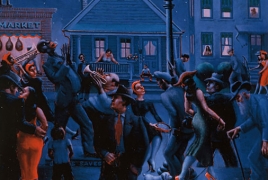Whitney Museum acquires Archibald Motley masterwork "Gettin’ Religion" January 12, 2016 - 17:15 AMT PanARMENIAN.Net - The Whitney Museum of American Art announces the acquisition of Archibald Motley’s Gettin’ Religion (1948), the first work by the great American modernist to enter the Whitney’s collection. On view currently in the exhibition Archibald Motley: Jazz Age Modernist, which will close its highly successful run at the Museum on Sunday, January 17, Gettin’ Religion, one of the artist’s iconic Chicago street scenes, is among the Whitney’s most important acquisitions of recent years, Art Daily reports. Motley first came to prominence in the 1920s during the early days of the Harlem Renaissance, the cultural flowering of African American art, music, and literature that extended beyond the New York neighborhood of its name to other cities, notably Chicago, where the artist spent most of his life. “For the last several years we have been working to bolster our holdings of works by key figures associated with the Harlem Renaissance and at the top of the list was bringing a major Motley painting into the collection,” noted Adam D. Weinberg, the Whitney’s Alice Pratt Brown Director. Motley had a long career and enjoyed recognition for his work early on—he was included in numerous exhibitions in the United States, including Contemporary Black Artists in America, shown at the Whitney in 1933—yet went through subsequent periods of struggle and obscurity. The current retrospective, Archibald Motley: Jazz Age Modernist, which was organized by the Nasher Museum of Art at Duke University and curated by noted art historian and Duke professor Richard J. Powell, has sought to reclaim Motley’s rightful place in American art history. After Archibald Motley: Jazz Age Modernist closes, on January 17, the painting will soon go on view in The Whitney’s Collection on the seventh floor. “The Whitney Museum has long championed artists such as Edward Hopper and Reginald Marsh who captured the everyday life of the city in their works. We are thrilled that we can now hang this crucial acquisition, Gettin’ Religion, alongside such mainstays of the collection,” said Dana Miller, the Whitney’s Richard DeMartini Family Curator and Director of the Collection. “We expect that within a very short period of time it will come to be regarded as one of the icons of the Whitney’s collection.” Motley took his primary artistic inspiration from the neighborhoods just south of Chicago’s main business district, a socially dynamic quarter known as the “Black Belt” and “Bronzeville,” both of which referred to the skin color of its inhabitants. The poet Langston Hughes described the neighborhood’s main leisure thoroughfare, known as “the Stroll,” as being crowded with “theaters, restaurants, and cabarets. And excitement from noon to noon. Midnight was like day. The street was full of workers and gamblers, prostitutes and pimps, church folks and sinners.” The broad demographics and shifting cityscape of Bronzeville are evident in Motley’s Gettin’ Religion (1948), in which he captures the full spectrum of African American urban life on display. The street bustles with characters including amorous young couples, the elderly, musicians, and children. A wooden house on the far side of the street is bracketed by an apartment building and a market; from the windows and porch the residents voyeuristically regard the parade of life in front of them, mirroring the viewer’s perspective. Motley fuses this vivid narrative with coloristic invention; he bathes the nocturnal scene in blues and purples and the cool light emanating from an electric lamppost is echoed by the stars that dot the indigo night sky. Gettin’ Religion was in the artist’s possession at the time of his death in 1981 and has since remained with his family. The Whitney purchased the work directly from Motley’s heirs. Photo: Valerie Gerrard Browne The creative crew of the Public TV had chosen 13-year-old Malena as a participant of this year's contest. She called on others to also suspend their accounts over the companies’ failure to tackle hate speech. Penderecki was known for his film scores, including for William Friedkin’s “The Exorcist”, Stanley Kubrick’s “The Shining”. The festival made the news public on March 19, saying that “several options are considered in order to preserve its running” Partner news |